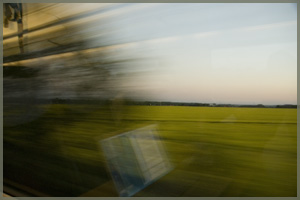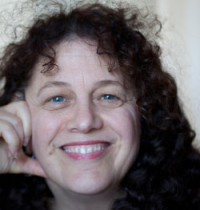
Right now I’m on the train to Dresden, thinking about language. I’m on my way to Dresden to experience what’s going on at the newly-formed World Café Europe’s first pan-European gathering, and I’m thinking about language because part of my role there will be to help convey this experience to others, and I am dreaming about ways to do that most effectively.
Processes like the World Café that offer replicable opportunities for individual and collective knowing almost always employ some form of “harvesting” as an essential part of their practice. It is often the ‘gestalt’ through which the group’s knowing is achieved – a complex and precise culmination of the deep listening and identifying of patterns that run through the gathering, and a conscious pulling together of diverse threads and perspectives into an articulate whole.
What might be possible if the harvesting was shared with the entire community of practice, or with the larger networks of people that employ these opportunities for collective knowing? If we could make this vast depth of knowledge and experience visible to everyone who was interested, might there be an accelerated collective apprehension and an experience of deep unity and connection beyond the specifics of any one group’s process?
Yesterday before I left for Germany I was having a conversation with my friend Michael Jones about different sorts of language – he’s identified three: the language of action (methods, protocols, prescriptions), the language of meaning (models, concepts, theory), and the language of story. In his system, the latter is more about conveying beauty, or an aesthetic, than it is reporting data. Using metaphor, the language of story is ambiguous, its meanings presented as a multiplicity, giving the listener’s imagination something to play with and explore from different angles. It sounds to me as if, using this definition, the language of story provides the material that can catalyze knowing in the listener. Full of question, its sentences are often more like gestures than statements; it’s the language of the senses, of experience itself.
This is the elusive language I am looking for, because important as they are for conveying useful data, I don’t think the language of action or meaning alone will engage the necessary senses in understanding what is really happening in a World Café. To access a language that takes us deep into the mystery of knowing we need details; vibrant, vivid details, alive with color and music.
I personally believe that the language of the senses – of smell and taste and touch and image – precedes story, in that these are the elements from which we create and share our stories. So what is for Michael the language of story I might call the language of the senses.
Whatever one calls it, this is the task I’ve set myself. Not only to call and ride the wave of this magical language of detail, story, and catalytic elementals, but to see if I can do so in a replicable way that would help others in their own harvesting. I have some great thinking companions in responding to this challenge, and I’m excited about this creative adventure, and the stories and catalyzations that might result.



mmmm…. rich thinking. I love how you’ve termed langauge of the senses. My mind jumps to how you invite the experience of unerstanding what you mean in addition to the cognition of understanding what you mean by “language of senses.”
As I listen in, I feel the steadiness of my heart beat and breath, an invitation to follow their palpable pace… and from their my mind joins the rhythm of
experiencing
each
word
each
phrase
listening
slowly
deeply
hearing
what
is
being
expressed
hearing
through
my senses
feeling
through
my
listening
looking forward to hearing more about this gathering and emergence.
with love,
ashley
Hi Amy, my dear new friend, How is it possible that we were three days together – working hard, but with a lot of fun – and we didn’t talk about Michael Jones! Did you know I recently ordered six copies of his book on Artful Leadership, because I want to give it to some people. (It takes some hurdles to order it from Europe). I had my own copy with me, and brought a spare one, which I gave in the last hour to Alain Gauthier! Give him my greetings if you see or talk with him!
And I like very much your ‘language of the senses’, it’s a pitty we didn’t have time to talk this through… I could have used more senses in my postings!
With much love,
Ria
for those of you who don’t yet have the pleasure of knowing the goddess Ria, she was my companion in live blogging the World Café Europe Dresden event this last week… Check out her posts on the blog!
Hi there Amy – I found your site via an invite to the Story Field Conference…Stories fascinate me and I am more and more focused on following story…I too am looking for new language and new ways of thinking…one line that caught my eye was your last: on what precedes story? It is a question I have been sitting with the last weeks and the two things I have come up with as not answers but certainly more things to explore are the language of song/melody, and dance. ie music and movement…and their interaction with breath. I believe that our words create our worlds but there is something even more powerful lurking – sounds/notes and interaction/interacting with sound…my thoughts are still unformed but I am clear that there is a lot to learn…and as I look at the world and muse about positive change and my role in it, and my own changes, the key to embodiment of knowledge and creation/discovery of ancient and new languages that are universal, connecting beyond word – in music and dance (and breath and thought) seem to be especially key. In dialogue, story, and spring sunshine, natalie
Natalie,
How juicy! I’d love to hear how your thinking evolves on this subject… please stay in touch!
Amy